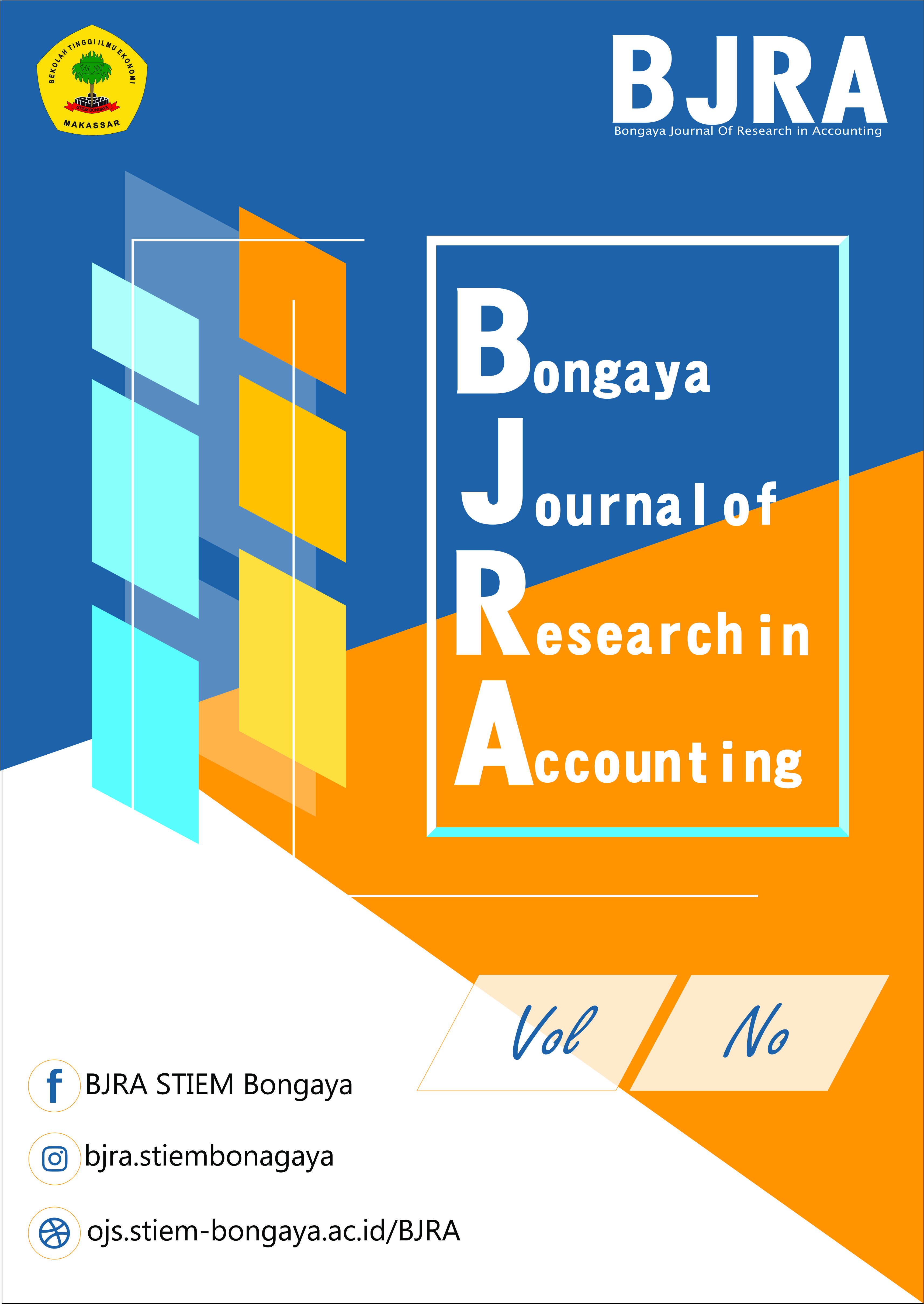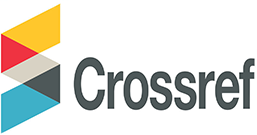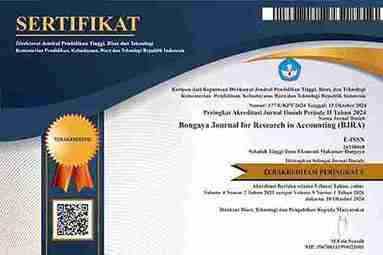Effectiveness of Internal Audit in Supporting Internal Control and Prevention of Fraud
DOI:
https://doi.org/10.37888/bjra.v4i1.271Keywords:
effectiveness of internal audit, internal, control over fraudAbstract
This study aims to analyze the effectiveness of internal audit at PT Bank Sulselbar Makassar in supporting internal control over fraud. This study uses a qualitative approach with the method of documentation, interviews and questionnaires to the internal auditors, anti-fraud department, and management as data collection methods. After the data was collected, data analysis was carried out using descriptive methods and measuring effectiveness. Based on the study results, it can be stated that the role of the Internal Audit Group as an internal audit in improving the internal control system for fraud at Bank Sulselbar has been influential. The internal audit of Bank Sulselbar has the authority to monitor the follow-up to the results of the audit conducted by the auditor. Monitoring activities are carried out to ensure that corrective actions have been carried out adequately and effectively. Thus, the company will implement better internal controls in the future because assessments and corrective actions for weaknesses and errors found are always carried out. There are three elements to prevent and detect fraud, namely a culture of honesty (personal), management responsibility to evaluate fraud risk (through internal control), and supervision by the audit committee (internal audit).
References
Agoes, S. (2004). Auditing. Fakultas Ekonomi Universitas Indonesia.
Albar, T. M., & Fitri, F. A. (2018). Pengaruh Komitmen Organisasi, Etika Organisasi, Keadilan Kompensasi, dan Sistem Pengendalian Internal Terhadap Fraud (Studi Empiris pada SKPD Pemerintah Kota Lhokseumawe). Jurnal Ilmiah Mahasiswa Ekonomi Akuntansi (JIMEKA), 3(3).
Amran, A., Susanto, E., Kalsum, U., Fitrianti, F., & Muslim, M. (2021). The Effect of Company Complexity and Company Size Against Audit Fees. Point of View Research Accounting and Auditing, 2(1), 59-65.
Arezky. (2014). Pembahasan Mengenai Fraud. arezky125.wordpress.com
Boynton.W.C., Johnson, R. ., & Kell, W. . (2006). Modern Auditing. Erlangga.
Dean J., C. (1990). Basic Statistics for Social Research (2nd ed.). Mac Milan Publishing Co.
Hajering, M. S. (2019). Moderating Ethics Auditors Influence of Competence, Accountability on Audit Quality. Jurnal Akuntansi, 23(3), 468-481.
Helena, R. (2012). Pengaruh Objektivitas dan Independensi Auditor Terhadap Laporan Audit. http://helenarizqia.blogspot.com/
Hery. (2010). Potret Audit Internal. Alfabeta.
Kumaat, V. G. (2011). Internal Audit. Erlangga.
Lannai, D., & Muslim, M. (2021). Causality of Fraud Detection. Jurnal Akuntansi, 25(1), 19-33.
Mahmudah, H., & Riyanto, B. (2016). Keefektifan Audit Internal Pemerintah Daerah. Jurnal Akuntansi, 10(1).
Mayangsari, S., & Wandanarum, P. (2013). Auditing Pendekatan Sektor Publik dan Privat. Jakarta: Media Bangsa.
Muslim, M., Ahmad, H., & Rahim, S. (2019). The effect of emotional, spiritual and intellectual intelligence on auditor professionalism at the inspectorate of South Sulawesi Province. The Indonesian Accounting Review, 9(1), 73-84.
Muslim, M., Ahmad, H., Rahim, S., & ARPelu, M. F. (2020). Client Pressures, Audit Tenure to Audit Quality: Moderation of Auditor Independence. Journal Of Auditing, Finance, And Forensic Accounting, 8(2).
Nusran, N. (2021). Can Leadership Style, Individual Ablity and Motivation Improve Banking Internal Auditor Performance?. Point of View Research Accounting and Auditing, 2(1), 100-108.
Pramono, S. (2014). No Title. Therapysource.Com. http://therapysource.com/2011/10/06/60-kejahatan-perbankan-libatkan-orang-dalam/
Rahayu, Siti Kurnia, and E. S. (2010). “Auditing: Konsep dasar dan pedoman pemeriksaan akuntan publik.” Yogyakarta: Graha Ilmu.
Rahim, S., Muslim, M., & Amin, A. (2019). Red Flag And Auditor Experience Toward Criminal Detection Trough Profesional Skepticism. Jurnal Akuntansi, 23(1), 47-62.
Sawyer, R., & Manavi, K. (2007). An audit on the management of gonorrhoea at the Whittall Street Clinic, Birmingham, UK. International journal of STD & AIDS, 18(5), 354-356.
Sholehah, N. L., Rahim, S., & Muslim, M. (2018). Pengaruh Pengendalian Internal, Moralitas Individu dan Personal Culture Terhadap Kecurangan Akuntansi (Studi Empiris Pada OPD Provinsi Gorontalo). ATESTASI : Jurnal Ilmiah Akuntansi, 1(1), 40-54. https://doi.org/10.33096/atestasi.v1i1.62
Soleman, R. (2013). Pengaruh Pengendalian Internal dan Good Corporate Governance terhadap Pencegahan Fraud. Jurnal Akuntansi Dan Auditing Indonesia, 17(1).
Sunarto. (2003). Auditing (1st ed.). Panduan.
Tunggal, A. W. (2012). The Fraud Audit Mencegah dan Mendeteksi Kecurangan Akuntansi. Harvarindo.
Tyasminingsih, A. (2010). Pengaruh Penerapan Aplikasi Faktur Pajak Elektronik (E-Faktur) Terhadap Tingkat Kepatuhan Wajib Pajak pada KPP Pratama Surabaya Wonocolo. Universitas Islam Negeri Maulana Malik Ibrahim.
Zainal, R., Fauzihardani, E., & Helmy, H. (2013). Pengaruh Efektivitas Pengendalian Intern, Asimetri Informasi dan Kesesuaian Kompensasi Terhadap Kecenderungan Kecurangan Akuntansi (Fraud).
Zelmiyanti, R., & Anita, L. (2015). Pengaruh Budaya Organisasi dan Peran Auditor Internal terhadap Pencegahan Kecurangan dengan Pelaksanaan Sistem Pengendalian Internal sebagai Variabel Intervening. Jurnal Politeknik Caltex Riau.
Yusuf, Syamsu. (2012). Psikologi Perkembangan Anak dan Remaja. Bandung: Remaja Rosdakarya
Yusuf, M., & Kanji, L. (2020). Effect of Internal Audit and Accounting Information System on the Effectiveness of Internal Control. ATESTASI: Jurnal Ilmiah Akuntansi, 3(2), 120-125.










